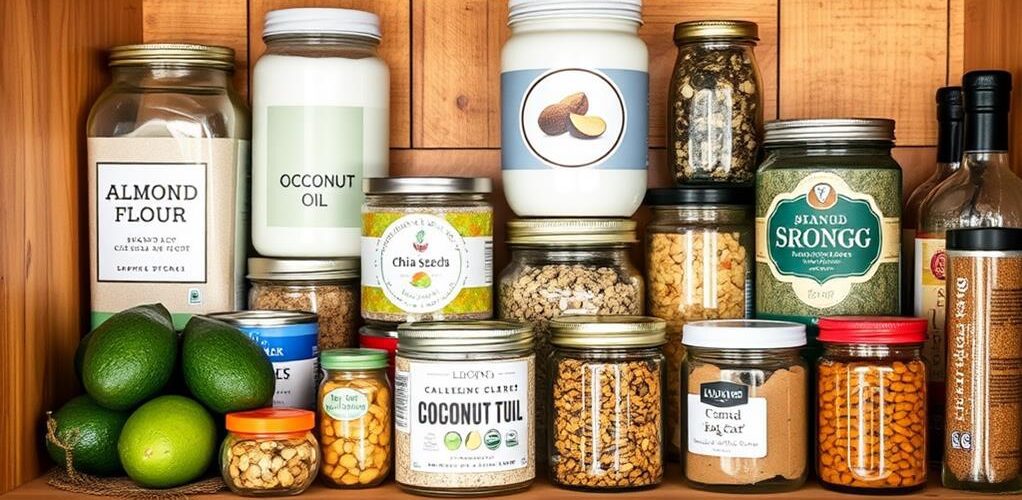
To ace the keto lifestyle, your pantry should always have some key staples. Stock up on keto flours like almond or coconut for baking, and keep plenty of eggs, ground beef, and canned fish for protein-packed meals. Don't forget your sugar-free sweeteners like erythritol or monk fruit to satisfy your sweet tooth without the carbs. Load up on low-carb veggies like spinach and zucchini and have healthy fats like olive oil, coconut oil, and ghee handy for cooking. Staying hydrated and balanced with electrolytes is essential too. Ready to transform your pantry? There's even more to explore!
Key Takeaways
- Stock keto flours like almond and coconut flour for low-carb baking and thickening.
- Keep protein options such as eggs, ground beef, and canned fish for versatile meal preparation.
- Use sugar-free sweeteners like erythritol and monk fruit to maintain sweetness without carbs.
- Incorporate healthy fats like olive oil, coconut oil, and ghee for cooking and flavoring.
- Maintain a variety of low-carb vegetables like spinach, zucchini, and broccoli for fiber and nutrients.
Essential Keto Ingredients
When starting on a ketogenic diet, having a well-stocked pantry of essential keto ingredients is indispensable for maintaining dietary goals and simplifying meal preparation.
First things first, let's talk about keto flours. Almond flour, coconut flour, and psyllium husk powder are must-haves. These low-carb flours are perfect for baking and thickening sauces without piling on the carbs. Imagine whipping up some keto pancakes or a tasty, low-carb snack that keeps you on track!
Now, let's not forget protein options. Eggs, ground beef, and canned fish like tuna or salmon should always be in your pantry. They make keto meal prepping a breeze and guarantee you get enough protein.
Of course, we all have a sweet tooth now and then, right? Stock up on sugar-free sweeteners like erythritol, allulose, and monk fruit. These let you enjoy a bit of sweetness without breaking your carb bank.
Lastly, low-carb vegetables like spinach, zucchini, and broccoli are essential. They're packed with fiber and nutrients, so you can add them to any meal while keeping your carb count low.
Healthy Fats and Oils
Having covered the must-have keto ingredients, it's equally important to focus on healthy fats and oils, which form the cornerstone of a ketogenic diet. These nutrient-dense fat sources are vital for providing the primary energy needed to maintain low carbohydrate intake and promote ketosis.
Let's explore the best options for your keto pantry!
First up, olive oil. This trusty oil is rich in monounsaturated fats and antioxidants, making it a heart-healthy choice. Plus, it's perfect for drizzling on salads or cooking up your favorite dishes.
Next, there's coconut oil, which boasts medium-chain triglycerides (MCTs). These MCTs can boost ketone production, giving you that extra energy kick.
Ghee, a type of clarified butter, is another excellent option. It's dairy-free and has a high smoke point, perfect for frying and sautéing without burning.
Avocado oil is also a superstar. Packed with heart-healthy fats, it's versatile enough for both cooking and making salad dressings.
But beware! Stay away from industrial seed oils like corn, soy, and canola oil. They're high in omega-6 fatty acids, which can cause inflammation if you eat too much.
Stick to these nutrient-dense fat sources to keep your keto journey on track!
Protein Sources
A well-rounded ketogenic diet relies heavily on quality protein sources to support muscle maintenance and overall health. Including a variety of proteins guarantees you get essential nutrients without unnecessary carbs.
Here are some top protein sources to keep in your keto pantry:
- Eggs: A cornerstone of the keto diet, eggs are versatile and cost-effective. With only 1 gram of carbs per large egg, they can be used in numerous egg recipes, from omelets to frittatas.
- Ground Beef: Ground beef is an excellent choice, typically containing 0 carbs per serving. It's perfect for beef variations like burgers, casseroles, and stir-fries, offering a hearty, satisfying protein source.
- Poultry: Chicken and turkey provide lean protein with minimal carbs, often less than 1 gram per serving. These poultry dishes can be easily prepared in various ways, from grilled chicken breasts to roasted turkey legs.
- Fatty Fish: Salmon and mackerel not only supply healthy omega-3 fatty acids but also serve as low-carb protein sources, generally containing less than 1 gram of carbs per serving. Fish preparations like grilled salmon or mackerel fillets are delicious and nutritious.
Additionally, bone broth is a nutrient-rich option that adds flavor and hydration, making it an ideal base for soups and enhancing protein intake on a keto diet.
Baking and Cooking Supplies
Building an extensive keto pantry not only involves quality protein sources but also includes a variety of baking and cooking supplies to maintain a low-carb lifestyle.
Key to keto baking techniques are keto flours like almond flour and coconut flour. Almond flour is versatile for many recipes, while coconut flour, known for its absorbent nature, requires extra moisture adjustments.
Don't forget essential baking ingredients! Gluten-free baking powder and xanthan gum add texture, while unsweetened cocoa powder lets you create keto-friendly desserts without added sugars.
Sweeteners like erythritol and allulose are your best friends in the kitchen. Erythritol mimics sugar's texture and sweetness, while allulose offers a similar taste without the calories.
Healthy fats such as coconut oil and ghee are vital for both keto cooking and baking. They provide moisture and richness, delivering the necessary fat content for a ketogenic diet.
Flavoring agents like vanilla extract and spices such as cinnamon and nutmeg can enhance the taste of your baked goods, making them delicious low-carb substitutions for classic recipes.
With these staples, your keto pantry will be well-equipped for any culinary adventure!
Hydration and Supplements
Maintaining proper hydration and supplementing essential nutrients are fundamental aspects of thriving on a ketogenic diet. When your body shifts into ketosis, it excretes more water and electrolytes, making hydration essential. A good rule of thumb is to drink at least half your body weight in ounces of water daily.
Electrolyte balance is also significant in preventing the dreaded "keto flu" during the initial adaptation phase. Key electrolytes like sodium, potassium, and magnesium should be incorporated into your diet. Sugar-free electrolyte powders or tablets can be lifesavers, especially if you're hitting the gym hard or sweating buckets.
Daily multivitamins are another staple to take into account. The restrictive nature of the keto diet can lead to deficiencies in vitamins and minerals like B vitamins and vitamin D. A daily multivitamin can fill those gaps and keep you feeling your best.
Natural options like moringa tea and dried elderberries can also be beneficial. They boost immunity and offer extra nutrients, supporting overall health on a keto lifestyle.
- Drink half your body weight in ounces of water daily.
- Use sugar-free electrolyte powders or tablets.
- Take daily multivitamins to fill nutritional gaps.
- Incorporate natural options like moringa tea and dried elderberries.
These hydration tips and supplements guarantee you stay balanced and healthy on your keto journey.
Community and Support
Engaging with a vibrant keto community can be a game-changer for anyone committed to this dietary lifestyle.
Whether you're just starting out or are a seasoned keto enthusiast, being part of an online community provides endless motivation. You can find recipe sharing and meal planning tips that make sticking to keto so much easier.
In forums or social media groups, you can celebrate milestones, like hitting your weight loss goals or mastering a tricky recipe. It's a place where everyone understands your journey, making it easier to stay accountable and feel connected.
Plus, access to blogs, books, and meal planning services can help you learn more and stick to your diet.
When you're unsure about which pantry staples to keep on hand, feedback from community members can be incredibly helpful. They can guide you in choosing items that suit your needs and tastes.
If you face any challenges, these communities are great for troubleshooting, offering shared experiences and practical solutions.
Frequently Asked Questions
What Food Staples Should I Always Have on Hand?
For effective keto meal prep and low-carb snacks, always stock low-carb vegetables, healthy fats like olive oil, versatile protein sources, keto flours such as almond and coconut, and sugar-free sweeteners like erythritol and stevia.
What Staples Should You Always Have in Your Pantry?
To maintain effective pantry organization and support a keto lifestyle, always stock keto snacks like nuts and seeds, low-carb flours such as almond and coconut flour, healthy fats, sugar-free sweeteners, canned proteins, and low-carb vegetables.
What Is the Number One Staple on a Keto Diet?
The number one staple on a keto diet is healthy fats, such as avocado oil or coconut oil. These keto fat sources are essential for meeting the diet's high-fat requirements and can be used in various low-carb snacks.
How Do I Stock My Pantry for Keto?
To stock your pantry for keto, include low-carb vegetables, high-fat dairy, versatile proteins, keto flours, and healthy fats. These essentials support keto cooking and meal prepping, ensuring you maintain a successful low-carb lifestyle.
Conclusion
Stocking a keto pantry with essential ingredients, healthy fats and oils, protein sources, baking and cooking supplies, and hydration and supplements guarantees a successful and sustainable ketogenic lifestyle. This foundational preparation aids in making informed dietary choices while also fostering a supportive community environment. Maintaining these staples not only simplifies meal preparation but also enhances overall adherence to the ketogenic diet, contributing to long-term health benefits and dietary satisfaction.
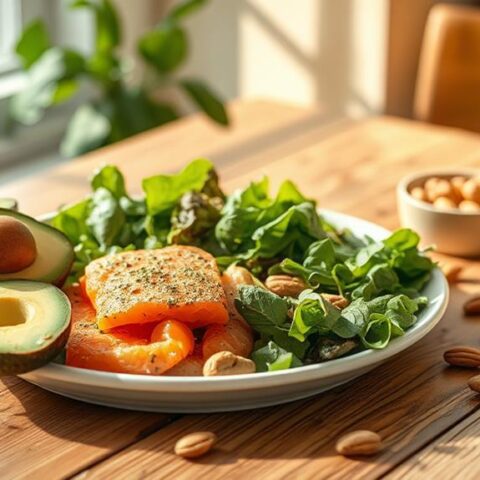

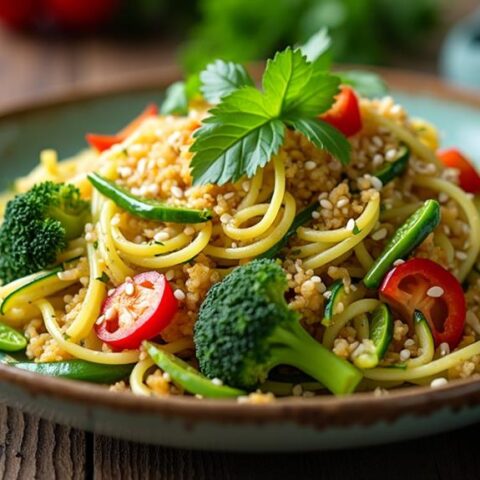
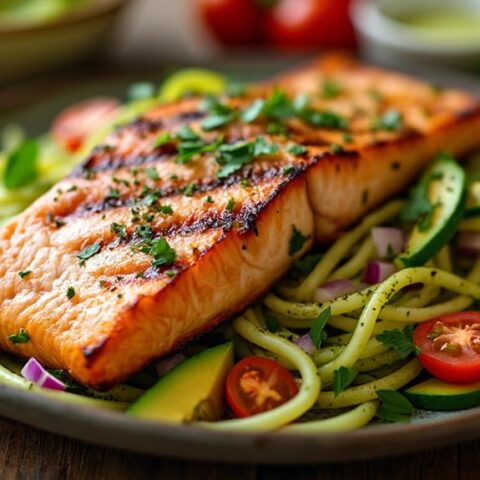
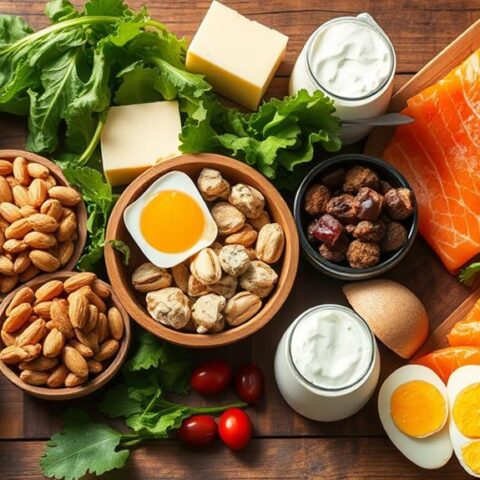
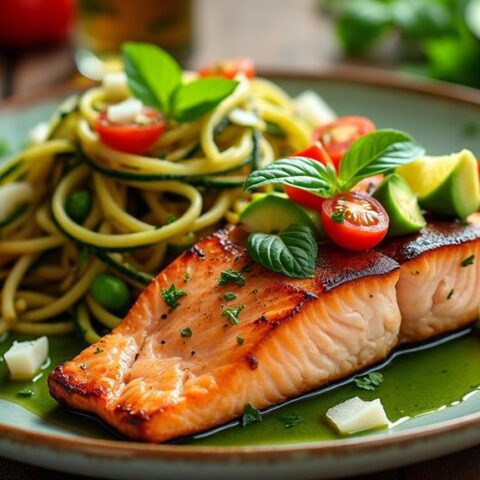




No Comments